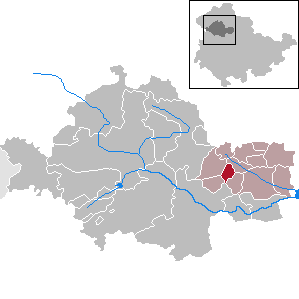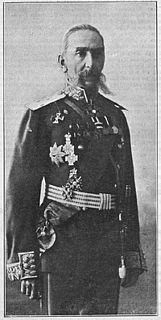
The Russo-Turkish War of 1828–1829 was sparked by the Greek War of Independence. The war broke out after the Sultan closed the Dardanelles to Russian ships and revoked the Akkerman Convention in retaliation for Russian participation in the Battle of Navarino.

The Russo-Turkish War (1806–1812) between the Russian Empire and the Ottoman Empire was one of the Russo-Turkish Wars.
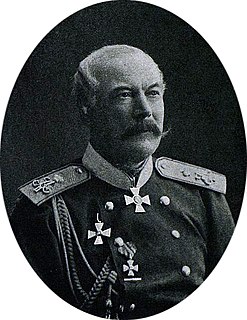
Franz Eduard Graf von Tottleben, better known as Eduard Totleben in English, was a Baltic German military engineer and Imperial Russian Army general. He was in charge of fortification and sapping work during a number of important Russian military campaigns.

The Treaty of Bucharest between the Ottoman Empire and the Russian Empire, was signed on 28 May 1812, in Manuc's Inn in Bucharest, and ratified on 5 July 1812, at the end of the Russo-Turkish War of 1806–12.
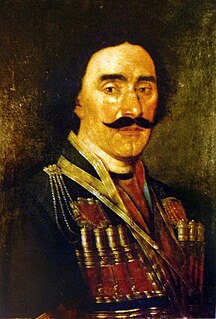
Solomon I, "the Great",, of the Bagrationi Dynasty, was King of Imereti from 1752 to 1766 and again from 1768 until his death in 1784.

The Russo-Persian War of 1826–28 was the last major military conflict between the Russian Empire and Iran.

Anaklia is a town and seaside resort in western Georgia. It is located in the Samegrelo-Zemo Svaneti region, at the place where the Enguri River flows into the Black Sea, near the administrative border with Abkhazia.

The country of Georgia became part of the Russian Empire in the 19th century. Throughout the early modern period, the Muslim Ottoman and Persian empires had fought over various fragmented Georgian kingdoms and principalities; by the 18th century, Russia emerged as the new imperial power in the region. Since Russia was an Orthodox Christian state like Georgia, the Georgians increasingly sought Russian help. In 1783, Heraclius II of the eastern Georgian kingdom of Kartli-Kakheti forged an alliance with the Russian Empire, whereby the kingdom became a Russian protectorate and abjured any dependence on its suzerain Persia. The Russo-Georgian alliance, however, backfired as Russia was unwilling to fulfill the terms of the treaty, proceeding to annex the troubled kingdom in 1801, and reducing it to the status of a Russian region. In 1810, the western Georgian kingdom of Imereti was annexed as well. Russian rule over Georgia was eventually acknowledged in various peace treaties with Persia and the Ottomans, and the remaining Georgian territories were absorbed by the Russian Empire in a piecemeal fashion in the course of the 19th century.
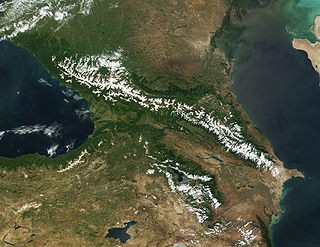
The Russian conquest of the Caucasus mainly occurred between 1800 and 1864. In that era the Russian Empire expanded to control the region between the Black Sea and Caspian Sea, the territory that is modern Armenia, Azerbaijan, Georgia, and parts of Iran and Turkey, as well as the North Caucasus region of modern Russia. Multiple wars were fought against the local rulers of the regions, as well as the dominant powers, the Ottoman Empire and Persian Empire, for control. By 1864 the last regions were brought under Russian control.

The history of the Caucasus region may be divided into the history of the Northern Caucasus (Ciscaucasia), historically in the sphere of influence of Scythia and of Southern Russia, and that of the Southern Caucasus in the sphere of influence of Persia, Anatolia and for a very brief time Assyria.
Leon or Levan was a grandson of King Heraclius II of Kartli and Kakheti, who led a Georgian-Ossetian rebellion against the Russian rule in 1810. He was killed by the Lesgian brigands in October 1812.

Constantine was a Georgian royal prince (batonishvili), belonging to the Imereti branch of the Bagrationi dynasty. A son of King David II of Imereti, Constantine was recognized as heir apparent by Solomon II, who had supplanted his father. Constantine's succession to the throne of Imereti was precluded by the Russian annexation of that country in 1810. Constantine subsequently entered the Russian Imperial military service, where he rose to the rank of Major-General.
David was a Georgian royal prince (batonishvili) of the Bagrationi dynasty of Imereti. He was killed in a rebellion against the Russian rule in Imereti. He was the ancestor of the now-extinct line of Princes and Serene Princes Bagration.
Ana Orbeliani was a Queen Consort of the western Georgian kingdom of Imereti as the wife of King David II. After David's deposition and death in exile in 1795, Ana tried to secure succession for her son Constantine during the reign of Solomon II, who had supplanted her husband. In her efforts, Ana relied on the Russian Empire, which eventually annexed Imereti in 1810. Ana spent the rest of her life in Russia, where she was known as tsaritsaAnna Matveyevna Imeretinskaya.

Shekvetili is a village and sea resort in Ozurgeti Municipality, Guria, Georgia, located on the eastern Black Sea coast, at the mouth of the Natanebi river. Shekvetili is home to the popular amusement park Tsitsinatela, large indoor venue Black Sea Arena, and the Miniature Park, an open air exhibition of scale models of Georgia's architectural landmarks.
Katsia II Dadiani, of the House of Dadiani, was Prince of Mingrelia from 1758 to 1788. His rule was dominated by complicated relations with the Kingdom of Imereti, which claimed suzerainty over all of western Georgia. In efforts to further his precarious sovereignty, Dadiani easily switched sides, allying himself, alternatively, with the Imeretians, Russians, and Ottomans, as exemplified by his vacillating position during the Russo-Turkish War (1768–1774).
Kaikhosro IV Gurieli was a member of the House of Gurieli, a ruling dynasty of the Principality of Guria in western Georgia, which he de facto ruled as regent for his underage nephew Mamia V Gurieli from 1797 to 1809. An energetic and learned man, he presided over a series of measures which brought relative order and stability to Guria. Kaikhosro remained influential even after conceding ruling powers to Mamia V in 1809. Despite rapprochement with the Russian Empire, Kaikhosro was suspicious of the Russian intentions. While Mamia remained loyal to Russia, Kaikhosro became involved in an uprising against the Russian hegemony in western Georgia in 1820. After the rebels' defeat, Kaikhosro had to flee to the Ottoman territory, where he died in 1829.
Mamia V Gurieli, of the House of Gurieli, became Prince of Guria, in western Georgia, in 1797. From 1797 to 1809, he was under the regency of his paternal uncle, Prince Kaikhosro. Mamia was a Europeanizing ruler, presiding over efforts to reform Guria's administration and education. Rejecting the vestiges of Ottoman overlordship, he made Guria an autonomous subject of the Russian Empire in 1810 and remained steadfast in allegiance to the new order even when his uncle Kaikhosro and leading nobles of Guria rose in arms against the Russian hegemony in 1820. Mamia's loyalty, even it was timidly displayed during a pacification campaign in Guria, was appreciated by the Russian government. Mamia himself grew increasingly depressed after the uprising and died in 1826, leaving his son David to become the last titular Prince of Guria.
David Gurieli was a Georgian nobleman of the House of Gurieli. He was the last titular Prince of Guria from 24 November 1826 to 9 September 1829, but he never actually ruled because of his young age and then due to the Russian occupation of his principality. He reconciled with the Russians and returned from his Ottoman exile as a private citizen in 1832. He was subsequently trained as an officer of the Imperial Russian Army and served in the Caucasus, where he died at the battle of Akhulgo.
The 1703 Ottoman invasion of western Georgia was a military expedition undertaken by the Ottoman Empire against the tributary states in western Georgia—Imereti, Guria, and Mingrelia. This considerable military deployment, ostensibly to settle a power struggle in Imereti in favor of the sultan's candidate, portended a change in Ottoman policy in the fluid frontier region in the Caucasus and aimed at consolidating the imperial authority among the restive Georgian subjects. The costly war contributed to the fall of Sultan Mustafa II, having incited a mutiny of the disaffected troops at Constantinople. The new Ottoman government curtailed the campaign and effected withdrawal from much of western Georgia's interior. The Turks held the Black Sea coastline and several fortresses close to the littoral.




